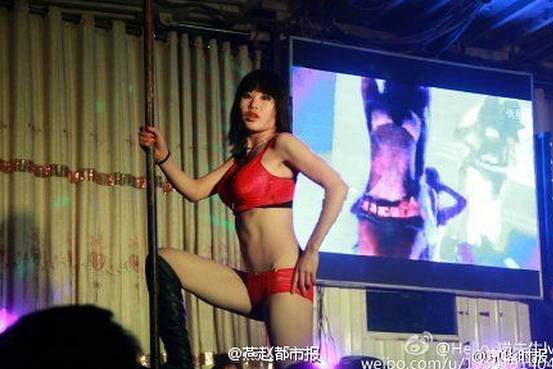At China Real Time, Te-Ping Chen and Josh Chin report a new crackdown on hiring strippers to appear at funerals alongside other professional tear-leaders.
According to a statement from the Ministry of Culture on Thursday, the government plans to work closely with the police to eliminate such performances, which are held with the goal of drawing more mourners.
Pictures of a funeral in the city of Handan in northern Hebei province last month showed a dancer removing her bra as assembled parents and children watched. They were widely circulated online, prompting much opprobrium. In its Thursday statement, the Ministry of Culture cited “obscene” performances in the eastern Chinese province of Jiangsu, as well as in Handan, and pledged to crack down on such lascivious last rites.
[…] The government has been trying to fight the country’s funereal stripper scourge for some time now. In 2006, the state-run broadcaster China Central Television’s leading investigative news show Jiaodian Fangtan aired an exposé on the practice of scantily clad women making appearances at memorial services in Donghai in eastern China’s Jiangsu province. [Source]
In 2013, officials were warned that unseemly opulent funerals “damaged the image of the Party and government, and ruined the social atmosphere.”
If a ban on models at this year’s Shanghai Autoshow is any guide, enforcement of the stripper ban may be lax. From Sue-Lin Wong at Reuters:
“I’m not called a ‘model’ here because they banned models this year,” said Dai Jun, 25, a part-time model working for a luxury European carmaker at the show. Dressed in a smart suit, Dai was standing next to one of the automaker’s new car models.
Others now work as “high-end sales consultants” or “tour guides” and are armed with brand information, giveaways and longer skirts. Many stood next to cars and posed for photos despite talk ahead of the show that this would not be allowed.
[…] In emailed comments to Reuters, He Yingrui, a spokeswoman for the autoshow, said models had been banned and the organisers hoped automakers would “resolutely stop evil activities and all kinds of low-brow delights and corrupt public morals.” [Source]
If restrictions do take hold, it could mark a broadening of what civil society expert Yiyi Lu has called the Party’s habitually “selective authoritarianism.” In March, she commented at China Real Time following the cropping of cleavage from a TV period drama:
[…] Unlike some other countries with an authoritarian bent, notably Singapore, where the state not only restricts political freedoms but also heavily regulates social practices and moral norms, China’s current governance system is perhaps best described as selective authoritarianism. In this system, the state concentrates its power and resources on policing activities and behavior that are seen as potentially threatening to the existing political order, but otherwise cares much less about social or moral order.
[…] There are signs that things could be changing under Xi, who seems intent on extending the state’s authoritarian reach. Last year, a popular television drama was taken abruptly off the air for a few days. It only returned after censors had cut the actresses’ cleavages. […]
It will be interesting to see how far Xi pushes this morality drive. […] [Source]








